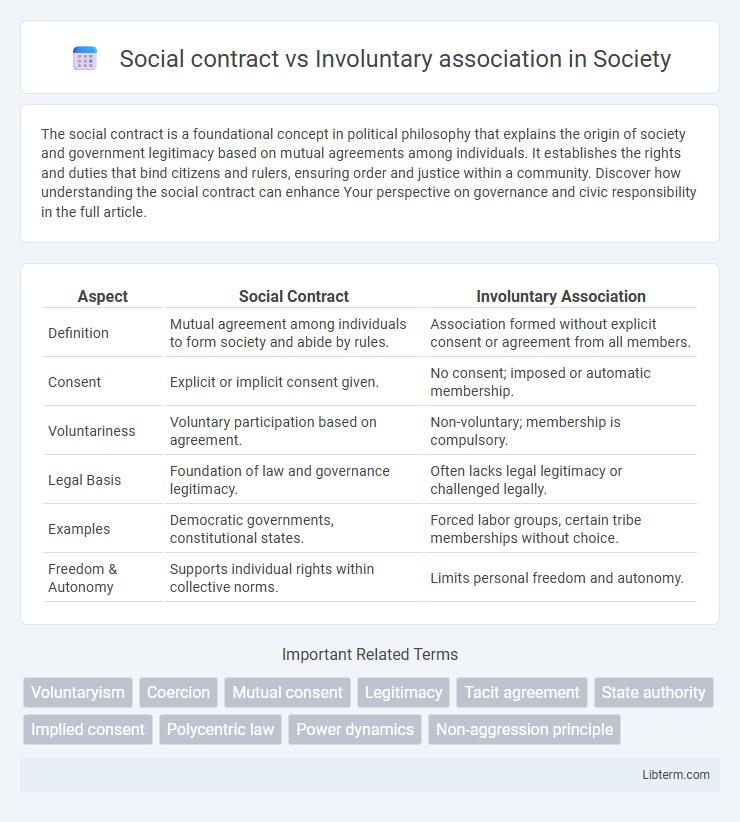The social contract is a foundational concept in political philosophy that explains the origin of society and government legitimacy based on mutual agreements among individuals. It establishes the rights and duties that bind citizens and rulers, ensuring order and justice within a community. Discover how understanding the social contract can enhance Your perspective on governance and civic responsibility in the full article.
Table of Comparison
| Aspect | Social Contract | Involuntary Association |
|---|---|---|
| Definition | Mutual agreement among individuals to form society and abide by rules. | Association formed without explicit consent or agreement from all members. |
| Consent | Explicit or implicit consent given. | No consent; imposed or automatic membership. |
| Voluntariness | Voluntary participation based on agreement. | Non-voluntary; membership is compulsory. |
| Legal Basis | Foundation of law and governance legitimacy. | Often lacks legal legitimacy or challenged legally. |
| Examples | Democratic governments, constitutional states. | Forced labor groups, certain tribe memberships without choice. |
| Freedom & Autonomy | Supports individual rights within collective norms. | Limits personal freedom and autonomy. |
Defining the Social Contract
The social contract is a foundational theory in political philosophy positing that individuals consent, either explicitly or implicitly, to surrender certain freedoms in exchange for the protection of rights and the maintenance of social order. It contrasts with involuntary association, where membership and obligations are imposed without personal agreement or choice. Defining the social contract centers on mutual consent and the establishment of collective governance based on the shared interests of its members.
Understanding Involuntary Association
Involuntary association occurs when individuals participate in groups or institutions without explicit consent, often constrained by legal, social, or economic pressures. Unlike the social contract theory, which emphasizes mutual agreement for collective governance, involuntary association raises concerns about autonomy and individual rights in contexts such as taxation, compulsory military service, and workplace obligations. Understanding involuntary association involves analyzing the balance between societal order and personal freedom, highlighting tensions that challenge the legitimacy of imposed memberships.
Historical Origins of Both Concepts
The social contract traces its roots to Enlightenment thinkers such as Thomas Hobbes, John Locke, and Jean-Jacques Rousseau, who theorized the formation of societies through mutual agreements to establish governance and protect rights. In contrast, involuntary association emerged historically from practices like feudalism and slavery, where individuals were bound by social or economic conditions without consent. These origins highlight fundamental differences: social contract theory emphasizes consensual agreement as the basis of political legitimacy, while involuntary association reflects coercion and lack of autonomy in societal relationships.
Key Philosophers and Theories
Thomas Hobbes and John Locke are pivotal figures in social contract theory, asserting that individuals consent to form governments to ensure security and order. In contrast, anarchist philosophers like Emma Goldman criticize involuntary association, arguing that legitimate social bonds must arise from free, voluntary participation rather than imposed obligations. Rousseau's concept of the general will further bridges these ideas by suggesting that true freedom is found in collective agreements reflecting the common good, challenging both compulsory association and unchecked individualism.
Consent in Social Contracts
Social contracts rely fundamentally on the explicit or implicit consent of individuals to establish legitimate authority and mutual obligations within a society. Unlike involuntary associations, where membership or compliance is imposed without agreement, social contracts emphasize voluntary participation and the acceptance of rules as a basis for political legitimacy. Consent in social contracts ensures that governance reflects the collective will, distinguishing it from coercion inherent in involuntary associations.
Coercion in Involuntary Associations
Involuntary associations often involve coercion, where individuals are compelled to participate without genuine consent or freedom of choice, contrasting sharply with the foundational principles of the social contract that emphasize mutual agreement and voluntary participation. Coercion in involuntary associations undermines legitimacy by imposing obligations or restrictions unilaterally, which can lead to resistance or conflict. The absence of consent highlights the ethical and political challenges in distinguishing legitimate authority from oppressive control.
Social Contract in Modern Governance
The social contract in modern governance establishes a framework where individuals consent, either explicitly or implicitly, to surrender certain freedoms in exchange for the protection of rights and maintenance of social order by the state. This consensual agreement legitimizes governmental authority and enforces laws that reflect collective interests, distinguishing it from involuntary associations where membership and obligations are imposed without mutual consent. Contemporary political systems rely on principles of social contract theory to ensure accountability, legal legitimacy, and the protection of civil liberties within democratic institutions.
Involuntary Associations in Society
Involuntary associations in society refer to groups or systems individuals are compelled to join or participate in without explicit consent, often due to legal, economic, or social pressures. These associations contrast sharply with social contracts, which are based on mutual agreement and consensual obligations among members. Examples include compulsory taxation, mandatory schooling, or government regulations, which shape societal functioning despite individual dissent.
Ethical and Legal Implications
The social contract establishes ethical and legal frameworks based on mutual consent, ensuring individual rights and societal responsibilities are recognized and enforced. Involuntary association raises significant ethical concerns regarding autonomy and freedom, often leading to legal challenges about coercion and consent validity. Analyzing the balance between individual liberties and collective obligations highlights the critical role of voluntary agreement in legitimizing social and legal structures.
Comparing Outcomes: Freedom vs. Obligation
Social contract theory emphasizes mutual agreement fostering collective freedom through shared obligations that uphold societal order, contrasting with involuntary association where individuals are subject to external authority without consent, often limiting personal liberty. Outcomes in social contracts promote balanced freedom by aligning individual rights with communal responsibilities, whereas involuntary associations frequently impose obligations that restrict autonomy and reinforce hierarchical control. This comparison highlights the tension between consensual cooperation supporting freedom and imposed structures prioritizing obligation over individual choice.
Social contract Infographic

 libterm.com
libterm.com